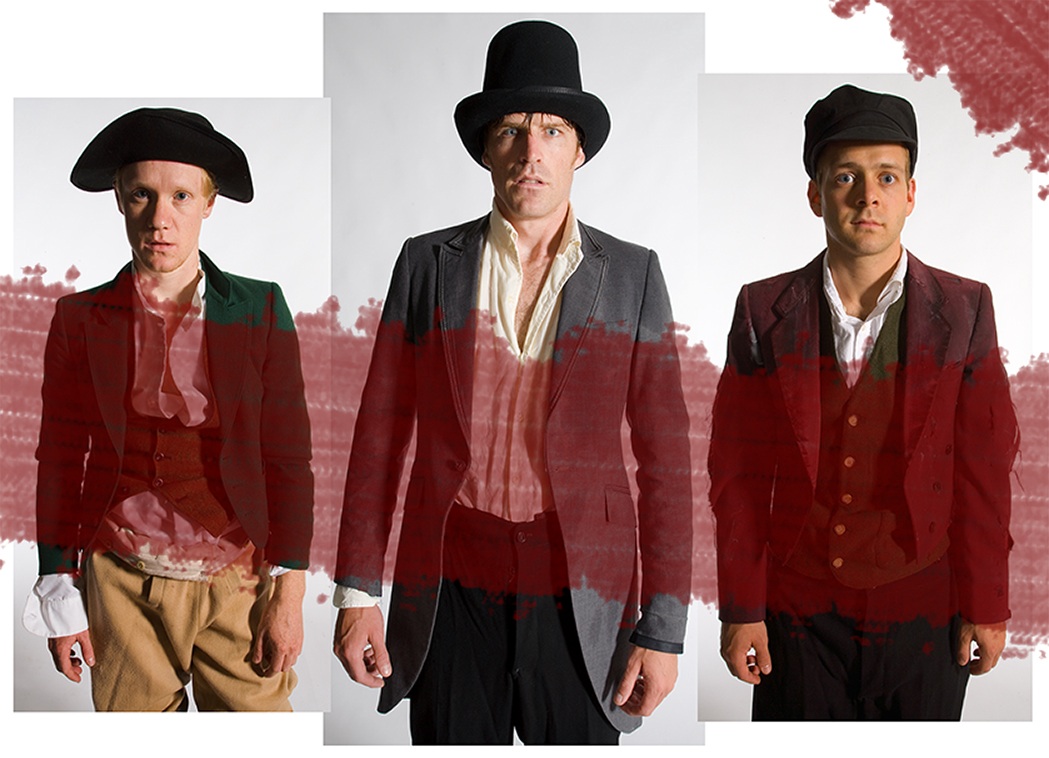Virtuous Men: “Or the White Whale”
Lightsey Darst saw the Civic Stage production of "Or the White Whale" at the Southern Theater. It was a problematic but dazzling performance.

I’ve been considering for a while what I should say about Civic Stage’s “Or the White Whale,” an adaptation of Herman Melville’s Moby Dick written by John Heimbuch, directed by Jon Ferguson, and produced by Steve Barberio. The show is good, but in a way that doesn’t invite the traditional comments on, oh, lighting and so forth. Instead, what most strikes me about this production is that it’s virtuous. Yes, that’s the word I want.
First, Heimbuch’s adaptation: Heimbuch is dedicated to the text, and the result is that the air is full of words. I’ve never heard the Southern so voluble. During the show I jotted down the words impertinent, disorderliness, and unsuffusing because I couldn’t quite believe I had heard them. The words aren’t mimed away or buried under stagecraft, either; Heimbuch unfurls them in good faith, believing that the actors will be intelligent enough to deliver them (which they are) and that the audience will be sober enough to understand them (which we should be—for this production, if for no other).
Heimbuch also doesn’t hold back on the ideas. Ahab’s quarrel with the whale unfolds into a quarrel with death and fate, while Ahab’s obsession reads sometimes as a driving curiosity, a spark that lifts man above himself, and sometimes as sinful pride. You don’t have to have read the book to glimpse the complexity of Melville’s creation; of how many adaptations can that be said? This show’s no stupid blubber hunt.
There’s something nervy about putting that much text on stage, about betting so much on the audience’s smarts and sobriety—and the nerve carries on to the basic set-up of the production: two hours, no intermission. Of course one sees why Ferguson et al chose to do it this way. Ishmael’s signed on for a three-year voyage in the Pequod, and so by analogy we sign up for a two-hour journey—no breaks, no let-up, no talking to your friends—on the ship that the Southern becomes. This refusal to bow to convention gives the production the brilliant obsession of an all-night reading in the honors dormitory of a boys’ school.
—Not that there’s anything schoolboy about the work on display here: this is professional theater and you will be well taken care of. Erica Zaffarano’s athletically pared-down design (one great sail at the back of the stage indicates the ship) backs up Ferguson’s physically inventive staging (“Call me Ishmael” comes off like the beginning to a great fish story, with Ishmael’s onstage audience hooting and cheering). And the acting is utterly convincing: Matt Sciple is the Ahab of a director’s dreams, furious, stentorian, yet vulnerable and desperate; Tim Cameron makes Ishmael a bewildered everyman; Noah Bremer transforms himself as Queequeg.
But back to that idea of virtue. Virtue derives from the Latin for man, from which we also get the word virile, and this, I confess, is what most struck me about “Or the White Whale”: the production’s replete with the energy, fearlessness, and sheer conviction that we associate with the male principle. The stage gleams with masculine energy: stomping, striking, singing, shouting, the actors revel in themselves, in their power. Ahab is powerful too, but he’s also full of fear—a masculine fear and hatred of death as a thing beyond one’s control, an agent who cannot be attacked, who has no face. “Or the White Whale” reads to this feminine spectator as a virtuoso exploration into maleness, its strength and weakness, its sincerity and its contradiction—a show at once tragedy and celebration.
At this point, to complain of anticlimax is to risk being taken as a punster. But I have to note that the show trails off, losing its confidence, in the last ten minutes or so. Ahab’s hooked up to fly (caught in his own harpoon line), but he only dangles for a few minutes before being released. The sailors go from living to dead with no perceptible change; there’s no moment when the boat sinks. After such a tense build-up, the audience craves a more dramatic cataclysm.
Still, “Or the White Whale” is stunning. Productions and performances like this don’t come along every day.